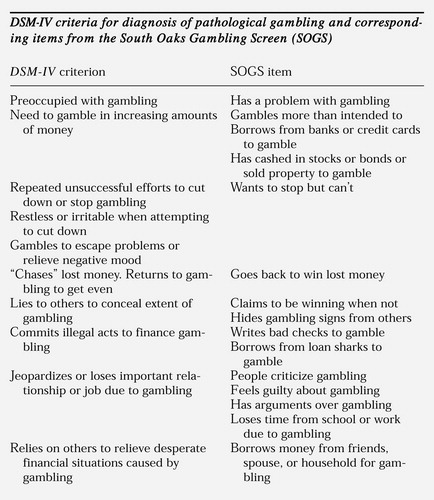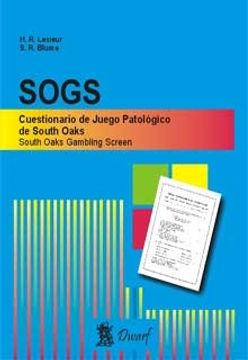Overview
- The South Oaks Gambling Screen is a 20-item questionnaire based on DSM- III criteria for pathological gambling. It may be self-administered or administered by nonprofessional or professional interv. The South Oaks Gambling Screen (SOGS): a new instrument for the identification of pathological gamblers American Journal of Psychiatry.
- South Oaks Gambling Screen - The SOGS is a lifetime measure of problem gambling that has been found to be reliable and valid. This 16-item screening tool places individuals in one of three.
- The evidence reviewed indicates that the construct of pathological gambling as represented by the SOGS and its variants provides a robust definition and implies that the SOGS meets the important.
- The South Oaks Gambling Screen (SOGS) was developed by Henry Lesieur, PhD, and Sheila Blume, MD, as a screen for compulsive gambling. It is a 20-item questionnaire based on DSM-III criteria for pathological gambling. It may be self-administered or administered by nonprofessional or professional interviewers.
The South Oaks Gambling Screen (SOGS) is a screen used to measure pathological gambling. This 16-item instrument asks questions related to many gambling behaviours. It also asks questions about how the individual feels about his or her own gambling habits. SOGS classifies individuals into one of three categories: non-problem gambler, problem gambler and probable pathological gambling. The SOGS can be used by individuals as a self-assessment tool, and mental health practitioners can also use this tool to screen their clients. A modified version of the SOGS for adolescents is also available and includes 12 items.
Key Points
It is important to remember that this tool is not a diagnoses of pathological gambling, however, studies have shown the SOGS to be a reliable and valid measure of gambling problems. The items relate to the clinical symptoms of gambling problem as presented by the DSM. Some authors have raised concerns with some of the questions asked in the SOGS. Specifically, questions regarding the amount of debt that a gambler accumulates and questions about having a line of credit are considered poor, as they do not directly measure gambling problems.

References
Stinchfield, R. (2002). Reliability, validity, and classification accuracy of the South Oaks Gambling Screen (SOGS). Addictive Behaviors, 27(1), 1-19.
Orford, J., Sproston, K., & Erens, B. (2003). SOGS and DSM-IV in the British Gambling Prevalence Survey: Reliability and factor structure. International Gambling Studies, 3(1), 53-65.
The SOGS may be reproduced as long as the language is used as printed and the scored items are not revised without permission of the author. TI: South Oaks Gambling Screen – Page 3 Revised: 01/06/03.
Young, M., & Stevens, M. (2008). SOGS and CGPI: Parallel comparison on a diverse population. Journal of Gambling Studies, 24(3), 337-356.
2. What is the largest amount of money you have ever gambled with on any one-day?
______ Never Gambled ______ More than $100.00 up to $1,000
______ $ 1.00 or less ______ More than $1,000 up to $10,000
______ More than $1.00 up to $10.00 ______ More than $10,000


______ More than $10.00 up to 100.00
3. Check which of the following people in your life has (or had) a gambling problem.

_______ Father _______ Mother
_______ Brother/Sister _______ My spouse/partner
_______ My child(ren) _______ Another relative
_______ A Friend or someone important in my life
4. When you gamble, how often do you go back another day to win back money you have lost?
_______ Never _______ Most of the time
_______ Some of the time _______ Every time that I lose
(less than half of time I lose).
5. Have you ever claimed to be winning money gambling, but weren’t really? In fact you lost?
_______ Never
_______ Yes, less than half the time I lost
_______ Yes, most of the time
6. Do you feel you have ever had a problem with betting or money gambling?
_______ No _______ Yes _______ Yes, in the past, but not now.
7. Did you ever gamble more than you intended to?
_______ Yes _______No
8. Have people criticized your betting or told you that you had a problem, regardless of whether or not you thought it was true?

_______ Yes _______No
9. Have you ever felt guilty about the way you gamble, or what happens when you gamble?
Songs Gambling
_______ Yes _______No